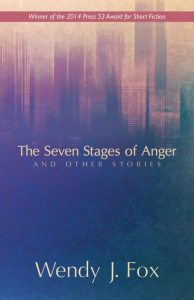
Press 53
124 pages, $14.95
Review by Jody Hobbs Hesler
It would be unfair to say I hungered for more emotion in Wendy J. Fox’s Seven Stages of Anger and Other Stories, because my very hunger is what the writer meant to evoke. These are, after all, stories of the modern West – a sere place peopled by characters who are just emerging from generations of isolated farm and desert life or who are working desk jobs and living in the now tamed-to-sterility post-Wild-West suburbs. The emotional hollowness and dislocation of Fox’s characters matches their positions in and relationships with this New West.
This collection is Fox’s debut, as well as the inaugural winner of the Press 53 Award for Short Fiction. All the stories take place somewhere in the West – some in rural, others in urban settings, mostly in Washington state. Sometimes the characters are young and house-hunting, about to start their families. Sometimes they have fled a life they knew in the rural wasteland and are seeking a new way in an unknown place. Sometimes the characters are in love. Almost all the time, the love is mistaken and breaks. Some of the characters recur, and Fox varies points-of-view, usually between first-person and close-third, though the title story experiments with second person. All the stories hearken to something missing.
In the title story, the main character grieves the dissolution of love that prefigures the couple’s abortion. Fox’s prose is terse and minimalist: “Days later we had that baby cut right out of me. And then we went home: my empty belly, your forked tongue.” What is missing matters here in the most literal and figurative ways.
A young woman’s first sexual experience in “Even After Fire, Daylight Comes” gets similar spare coverage. “It was the first time she’d had a man in her bed, but she didn’t tell him and didn’t cry.” This rendering seems to treat sex as just one more thing you have to do to survive. There is no joy in it, which is fitting because the lover later leaves her in an almost verbatim replay of the way her father had left their family years before. The entire love story echoes that lifelong lack.
When Fox turns her attention to the way place shapes her characters, her language remains taut and precise, and the starkness and isolation sometimes reach fever pitch. “As children growing up in the eastern Washington desert, the dry side of the Cascades,” begins “Apricots,” the opening story of collection, “we learned to speak of rain the way we spoke of the dead: with reverence, with longing, without hope of return.” The people seem bound to the land through its losses and privations, through their struggle to survive despite it.
Vacancy and emotional voids define the characters’ feelings toward one another and themselves and toward their landscape. This pervading starkness is what makes these stories special, turning my hunger for more emotion into an honest response rather than an unsatisfied desire.
***
Jody Hobbs Hesler lives and writes in the foothills of the Blue Ridge Mountains. Her fiction, feature articles, essays, and book reviews appear or are forthcoming in Gargoyle, The Georgia Review, Sequestrum, Steel Toe Review, Valparaiso Fiction Review, Prime Number, Pearl, A Short Ride: Remembering Barry Hannah (VOX Press), Charlottesville Family Magazine, and several regional prize anthologies and other publications. You can learn more about her writing at jodyhobbshesler.com.
![[PANK]](https://pankmagazine.com/wp-content/themes/pank/assets/images/pank-logo-large.png)
